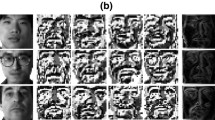Abstract
Recently semi-supervised learning has attracted a lot of attention. Different from traditional supervised learning, semi-supervised learning makes use of both labeled and unlabeled data. In face recognition, collecting labeled examples costs human effort, while vast amounts of unlabeled data are often readily available and offer some additional information. In this paper, based on Support Vector Machine (SVM), we introduce a novel semi-supervised learning method for face recognition. The basic idea of the method is that, if two data points are close to each other, they tend to share the same label. Therefore, it is reasonable to search a projection with maximal margin and locality preserving property. We compare our method to standard SVM and transductive SVM. Experimental results show efficiency and effectiveness of our method.
Preview
Unable to display preview. Download preview PDF.
Similar content being viewed by others
References
He, Y., Yan, S., Hu, Y., Niyogi, P., Zhang, H.-J.: Face Recognition Using Laplacianfaces. IEEE Trans. on Pattern Analysis and Machine Intelligence 27, 328–340 (2005)
Belkin, M., Niyogi, P.: Semi-supervised Learning on Riemannian Manifolds. Technical Report, TR-2001-30, Univ. of Chicago, Computer Science Dept. (2001)
He, X., Niyogi, P.: Locality Preserving Projections. Advances in Neural Information Processing Systems 16 (2003)
Vapnik, V.N.: The Nature of Statistical Learning Theory. Springer, Heidelberg (1995)
Chung, F.R.K.: Spectral Graph Theory. Volume 92 of Regional Conference Series in Mathematics (1997)
Author information
Authors and Affiliations
Editor information
Editors and Affiliations
Rights and permissions
Copyright information
© 2006 Springer-Verlag Berlin Heidelberg
About this paper
Cite this paper
Lu, K., He, X., Zhao, J. (2006). Semi-supervised Support Vector Learning for Face Recognition. In: Wang, J., Yi, Z., Zurada, J.M., Lu, BL., Yin, H. (eds) Advances in Neural Networks - ISNN 2006. ISNN 2006. Lecture Notes in Computer Science, vol 3972. Springer, Berlin, Heidelberg. https://doi.org/10.1007/11760023_16
Download citation
DOI: https://doi.org/10.1007/11760023_16
Publisher Name: Springer, Berlin, Heidelberg
Print ISBN: 978-3-540-34437-7
Online ISBN: 978-3-540-34438-4
eBook Packages: Computer ScienceComputer Science (R0)




